Overview
While most Americans oppose government funding of abortion, a new Pew Research Center survey finds that concern about abortion funding plays only a small role in driving opposition to the health care reform legislation under consideration by Congress.
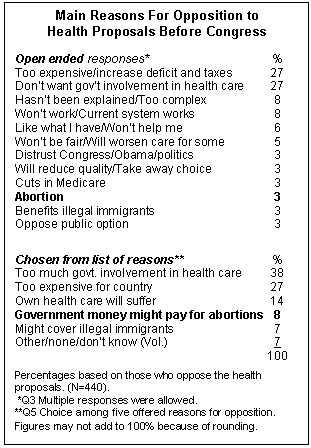
When health care opponents are asked in an open-ended question to describe their main reason for opposing the congressional proposals, just 3% raise the issue of abortion funding.
Even when they are asked to choose among a list of reasons, fewer than one-in-ten (8%) opponents of health care legislation say the most important reason for their opposition is the possibility that government money might pay for abortions. Although a majority of health reform opponents (56%) cite the abortion issue as one of the major factors for them, far greater percentages cite concerns about big government, costs and the impact of reform on people’s own coverage.
The new survey by the Pew Research Center for the People & the Press and the Pew Forum on Religion & Public Life finds the public now divided over the health care proposals in Congress, with 42% in favor and 39% opposed. Earlier this month, before the House voted on its bill, 38% supported the reform proposals and 47% were opposed. The current poll was conducted Nov. 12-15 among 1,003 adults on landlines and cell phones.
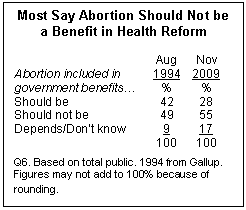
A 55% majority of Americans say that abortion should not be included as a guaranteed medical benefit if the government health care reform plan passes. Only about half as many (28%) say it should be included. The public was more evenly divided in a comparable Gallup survey conducted during the health care debate in 1994. At that time 42% said abortion should be covered by government benefits while 49% said it should not be. More than seven-in-ten (72%) of those who oppose the legislation say coverage of abortion should not be included in government benefits. Even among Americans who favor health care reform, a 46% plurality says abortion should not be included in government benefits, while 35% say it should be.
But when respondents in the survey were asked to explain, in their own words, the main reasons for supporting or opposing the reform proposals, few brought up abortion funding. Supporters of reform cite the expansion of coverage to the uninsured (32%), the need for change (17%) and the need to control costs (14%) as most important to them. Opponents of reform mainly cite either the cost (27%) or the increased role that government would play (27%). Other reasons for opposition include the complexity of the legislation (8%) or skepticism that reforms won’t work (8%). Few opponents of reform – just 3% – volunteer abortion as a principal reason for their opposition.
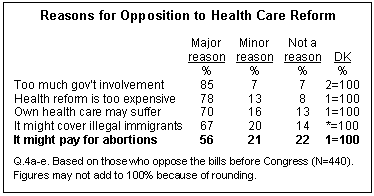
Even when respondents were specifically asked about government funding for abortion in the context of health care reform, the issue ranks at the bottom of a list of possible reasons for opposing the legislation. While 56% of opponents say the issue of government funds possibly paying for abortions is a “major reason” they oppose the bill, that ranks far below other arguments against the bill. Fully 85% say that “too much government involvement in health care” is a major reason for their opposition, and nearly as many (78%) say this about the expense of health care reform. Seven-in-ten (70%) say concern that their own health care might suffer is a major reason they oppose the legislation, and nearly as many (67%) say the possibility that reform might cover illegal immigrants is a major reason for opposing it.
White evangelical Protestants (74%) and white Catholics (72%) were more likely than white mainline Protestant opponents of reform to say that abortion funding was a major reason for their views. But even within these religious groups, larger shares list the expansion of government as a major factor. Nearly all opponents of the legislation cited multiple concerns as major reasons for their position, and not one cited abortion as the only major reason they opposed the bills before Congress. In other words, every single person who said abortion funding was a major reason that they opposed the bill also cited one or more other major reasons.
When asked to choose the single most important issue from a list of possible reasons, 8% of opponents selected abortion funding. This translates into just 3% of all Americans who both oppose the legislation and say abortion funding is the main reason for their position. Among opponents, concern about too much government involvement topped the list, with 38% saying it was the most important reason, followed by 27% who cited the expense of reform. Fewer cited the risk to their own health care (14%) or the possibility that illegal immigrants might be covered (7%).
Abortion funding is rarely cited as the key factor behind opposition to the health care bills even among white Catholics and evangelical Protestants. While 84% of white evangelical Protestants say they oppose allowing abortions to be included in government medical benefits, just 10% of those who oppose the bill say this is the most important reason of the five factors asked about. Similarly, 63% of white Catholics oppose the idea of government funding going toward abortions, but just 11% of white Catholics who oppose health legislation say this is the biggest factor in their position. And just 4% of the white evangelicals and 3% of the white Catholics who oppose the health legislation before Congress volunteer abortion as their main concern in an open-ended question.
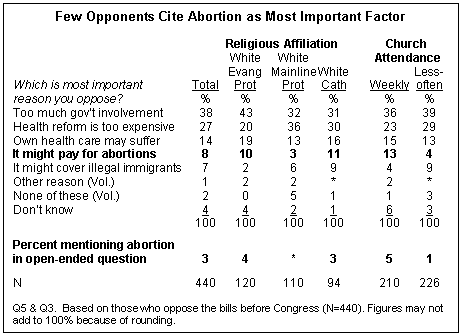
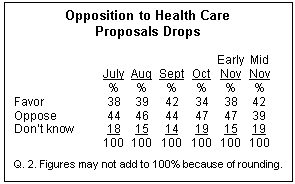
The debate over abortion funding and health care flared up just prior to the reform bill’s passage by the House on November 7. Yet, if anything, opposition to health reform has declined somewhat since earlier this month, before the House passed its version. Currently, 39% oppose the health care bills being debated in Congress, down 8 points, while 42% favor them. But a significant number of Americans remain uncertain about the proposals – nearly one-in-five (19%) say they don’t know how they feel about the legislation at this point.




